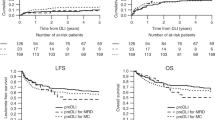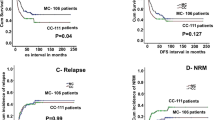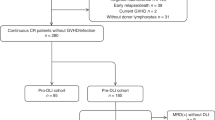Abstract
In this retrospective study, we evaluated donor lymphocyte infusions given for relapsed (n=48) or persistent (n=15) myeloma following non-myeloablative allogeneic stem cell transplantation (Allo-SCT). Twenty-four of 63 patients (38.1%) responded: 12 patients (19.0%) with a partial response (PR) and 12 patients (19.0%) with a complete response (CR). Overall survival after donor lymphocyte infusions (DLI) was 23.6 months (1.0–50.7+). Median overall survival for non-responding patients was 23.6 months and has not been reached for the patients responding to DLI. In responders, progression-free survival after DLI was 27.8 months (1.2–46.2+). Patients with a PR had a median progression-free survival of 7.0 months, whereas patients with a CR to DLI had a median progression-free survival of 27.8 months. Major toxicities were acute graft-versus-host disease (GVHD) (38.1%) and chronic GVHD (42.9%). Seven patients (11.1%) died from treatment-related mortality. The only significant prognostic factors for response to DLI were the occurrence of acute and chronic GVHD. There was a trend towards significance for time between transplantation and DLI, and response. Donor lymphocyte infusion following non-myeloablative Allo-SCT is a valuable strategy for relapsed or persistent disease.
This is a preview of subscription content, access via your institution
Access options
Subscribe to this journal
Receive 12 print issues and online access
$259.00 per year
only $21.58 per issue
Buy this article
- Purchase on Springer Link
- Instant access to full article PDF
Prices may be subject to local taxes which are calculated during checkout




Similar content being viewed by others
References
Reynolds C, Ratanatharathorn V, Adams P, Braun T, Silver S, Ayash L et al. Allogeneic stem cell transplantation reduces disease progression compared to autologous transplantation in patients with multiple myeloma. Bone Marrow Transplant 2001; 27: 801–807.
Zeiser R, Bertz H, Spyridonidis A, Houet L, Finke J . Donor lymphocyte infusions for multiple myeloma: clinical results and novel perspectives. Bone Marrow Transplant 2004; 34: 923–928.
Gahrton G, Tura S, Ljungman P, Blade J, Brandt L, Cavo M et al. Prognostic factors in allogeneic bone marrow transplantation for multiple myeloma. J Clin Oncol 1995; 13: 1312–1322.
Goldschmidt H, Egerer G, Ho AD . Autologous and allogeneic stem cell transplantation in multiple myeloma. Bone Marrow Transplant 2000; 25 (Suppl 2): S25–S26.
Lokhorst HM, Segeren CM, Verdonck LF, van der HB, Raymakers R, van Oers MH et al. Partially T-cell-depleted allogeneic stem-cell transplantation for first-line treatment of multiple myeloma: a prospective evaluation of patients treated in the phase III study HOVON 24 MM. J Clin Oncol 2003; 21: 1728–1733.
Badros A, Barlogie B, Siegel E, Cottler-Fox M, Zangari M, Fassas A et al. Improved outcome of allogeneic transplantation in high-risk multiple myeloma patients after nonmyeloablative conditioning. J Clin Oncol 2002; 20: 1295–1303.
Kroger N, Schwerdtfeger R, Kiehl M, Sayer HG, Renges H, Zabelina T et al. Autologous stem cell transplantation followed by a dose-reduced allograft induces high complete remission rate in multiple myeloma. Blood 2002; 100: 755–760.
Maloney DG, Molina AJ, Sahebi F, Stockerl-Goldstein KE, Sandmaier BM, Bensinger W et al. Allografting with nonmyeloablative conditioning following cytoreductive autografts for the treatment of patients with multiple myeloma. Blood 2003; 102: 3447–3454.
Lokhorst HM, Schattenberg A, Cornelissen JJ, Thomas LL, Verdonck LF . Donor leukocyte infusions are effective in relapsed multiple myeloma after allogeneic bone marrow transplantation. Blood 1997; 90: 4206–4211.
Salama M, Nevill T, Marcellus D, Parker P, Johnson M, Kirk A et al. Donor leukocyte infusions for multiple myeloma. Bone Marrow Transplant 2000; 26: 1179–1184.
Kolb HJ, Schmid C, Barrett AJ, Schendel DJ . Graft-versus-leukemia reactions in allogeneic chimeras. Blood 2004; 103: 767–776.
Lokhorst HM, Schattenberg A, Cornelissen JJ, van Oers MH, Fibbe W, Russell I et al. Donor lymphocyte infusions for relapsed multiple myeloma after allogeneic stem-cell transplantation: predictive factors for response and long-term outcome. J Clin Oncol 2000; 18: 3031–3037.
Lokhorst HM, Wu K, Verdonck LF, Laterveer LL, van de Donk NW, van Oers MH et al. The occurrence of graft-versus-host disease is the major predictive factor for response to donor lymphocyte infusions in multiple myeloma. Blood 2004; 103: 4362–4364.
Ayuk F, Shimoni A, Nagler A, Schwerdtfeger R, Kiehl M, Sayer HG et al. Efficacy and toxicity of low-dose escalating donor lymphocyte infusion given after reduced intensity conditioning allograft for multiple myeloma. Leukemia 2004; 18: 659–662.
Blade J, Samson D, Reece D, Apperley J, Bjorkstrand B, Gahrton G et al. Criteria for evaluating disease response and progression in patients with multiple myeloma treated by high-dose therapy and haemopoietic stem cell transplantation. Myeloma Subcommittee of the EBMT. European Group for Blood and Marrow Transplant. Br J Haematol 1998; 102: 1115–1123.
Thomas ED, Storb R, Clift RA, Fefer A, Johnson L, Neiman PE et al. Bone-marrow transplantation (second of two parts). N Engl J Med 1975; 292: 895–902.
Shulman HM, Sullivan KM, Weiden PL, McDonald GB, Striker GE, Sale GE et al. Chronic graft-versus-host syndrome in man. A long-term clinicopathologic study of 20 Seattle patients. Am J Med 1980; 69: 204–217.
Kroger N, Sayer HG, Schwerdtfeger R, Kiehl M, Nagler A, Renges H et al. Unrelated stem cell transplantation in multiple myeloma after a reduced-intensity conditioning with pretransplantation antithymocyte globulin is highly effective with low transplantation-related mortality. Blood 2002; 100: 3919–3924.
Perez-Simon JA, Martino R, Alegre A, Tomas JF, De Leon A, Caballero D et al. Chronic but not acute graft-versus-host disease improves outcome in multiple myeloma patients after non-myeloablative allogeneic transplantation. Br J Haematol 2003; 121: 104–108.
Corradini P, Tarella C, Olivieri A, Gianni AM, Voena C, Zallio F et al. Reduced-intensity conditioning followed by allografting of hematopoietic cells can produce clinical and molecular remissions in patients with poor-risk hematologic malignancies. Blood 2002; 99: 75–82.
Kroger N, Shimoni A, Zagrivnaja M, Ayuk F, Lioznov M, Schieder H et al. Low-dose thalidomide and donor lymphocyte infusion as adoptive immunotherapy after allogeneic stem cell transplantation in patients with multiple myeloma. Blood 2004; 104: 3361–3363.
Sun K, Welniak LA, Panoskaltsis-Mortari A, O’Shaughnessy MJ, Liu H, Barao I et al. Inhibition of acute graft-versus-host disease with retention of graft-versus-tumor effects by the proteasome inhibitor bortezomib. Proc Natl Acad Sci USA 2004; 101: 8120–8125.
Schey SA, Fields P, Bartlett JB, Clarke IA, Ashan G, Knight RD et al. Phase I study of an immunomodulatory thalidomide analog, CC-4047, in relapsed or refractory multiple myeloma. J Clin Oncol 2004; 22: 3269–3276.
van de Donk NW, Kroger N, Hegenbart U, Corradini F, San Miguel JF, Goldachmidt H et al. Remarkable activity of novel agents bortezomib and thalidomide in patients not responding to donor lymphocyte infusions following nonmyeloablative allogeneic stem cell transplantation in multiple myeloma. Blood 2006; 107: 3415–3416.
Author information
Authors and Affiliations
Corresponding author
Rights and permissions
About this article
Cite this article
van de Donk, N., Kröger, N., Hegenbart, U. et al. Prognostic factors for donor lymphocyte infusions following non-myeloablative allogeneic stem cell transplantation in multiple myeloma. Bone Marrow Transplant 37, 1135–1141 (2006). https://doi.org/10.1038/sj.bmt.1705393
Received:
Revised:
Accepted:
Published:
Issue Date:
DOI: https://doi.org/10.1038/sj.bmt.1705393
Keywords
This article is cited by
-
Outcomes in newly diagnosed young or high-risk myeloma patients receiving tandem autologous/allogeneic transplant followed by bortezomib maintenance: a phase II study
Bone Marrow Transplantation (2022)
-
Donor lymphocyte infusions for B-cell malignancies relapse after T-cell replete allogeneic hematopoietic cell transplantation
Bone Marrow Transplantation (2019)
-
Optimizing peripheral blood stem cells transplantation outcome through amend relapse and graft failure: a review of current literature
Experimental Hematology & Oncology (2017)
-
Donor T-cell responses and disease progression patterns of multiple myeloma
Bone Marrow Transplantation (2017)
-
Minimal residual disease- and graft-vs.-host disease-guided multiple consolidation chemotherapy and donor lymphocyte infusion prevent second acute leukemia relapse after allotransplant
Journal of Hematology & Oncology (2016)



